| Listing 1 - 10 of 21 | << page >> |
Sort by
|
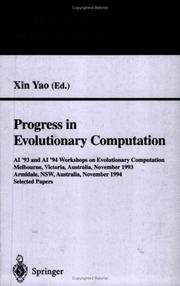
ISBN: 3540601546 3540495282 9783540601548 Year: 1995 Volume: 956 Publisher: Berlin: Springer,
Abstract | Keywords | Export | Availability | Bookmark
 Loading...
Loading...Choose an application
- Reference Manager
- EndNote
- RefWorks (Direct export to RefWorks)
This volume contains the best carefully revised full papers selected from the presentations accepted for the AI '93 and AI '94 Workshop on Evolutionary Computation held in Australia. The 21 papers included cover a wide range of topics in the field of evolutionary computation, from constrained function optimization to combinatorial optimization, from evolutionary programming to genetic programming, from robotic strategy learning to co-evolutionary game strategy learning. The papers reflect important recent progress in the field; more than half of the papers come from overseas.
Evolutionary programming (Computer science) --- Genetic algorithms --- Artificial intelligence --- Congresses. --- Congresses --- Artificial intelligence. --- Numerical analysis. --- Distribution (Probability theory. --- Statistics. --- Operations research. --- Combinatorics. --- Artificial Intelligence. --- Numerical Analysis. --- Probability Theory and Stochastic Processes. --- Statistics, general. --- Operations Research/Decision Theory. --- Combinatorics --- Algebra --- Mathematical analysis --- Operational analysis --- Operational research --- Industrial engineering --- Management science --- Research --- System theory --- Statistical analysis --- Statistical data --- Statistical methods --- Statistical science --- Mathematics --- Econometrics --- Distribution functions --- Frequency distribution --- Characteristic functions --- Probabilities --- AI (Artificial intelligence) --- Artificial thinking --- Electronic brains --- Intellectronics --- Intelligence, Artificial --- Intelligent machines --- Machine intelligence --- Thinking, Artificial --- Bionics --- Cognitive science --- Digital computer simulation --- Electronic data processing --- Logic machines --- Machine theory --- Self-organizing systems --- Simulation methods --- Fifth generation computers --- Neural computers --- Evolutionary programming (Computer science) - Congresses. --- Genetic algorithms - Congresses. --- Artificial intelligence - Congresses.
Book
ISBN: 9812817476 1299133010 Year: 1999 Publisher: Singapore : World Scientific,
Abstract | Keywords | Export | Availability | Bookmark
 Loading...
Loading...Choose an application
- Reference Manager
- EndNote
- RefWorks (Direct export to RefWorks)
Evolutionary computation is the study of computational systems which use ideas and get inspiration from natural evolution and adaptation. This book is devoted to the theory and application of evolutionary computation. It is a self-contained volume which covers both introductory material and selected advanced topics. The book can roughly be divided into two major parts: the introductory one and the one on selected advanced topics. Each part consists of several chapters which present an in-depth discussion of selected topics. A strong connection is established between evolutionary algorithms and traditional search algorithms. This connection enables us to incorporate ideas in more established fields into evolutionary algorithms. The book is aimed at a wide range of readers. It does not require previous exposure to the field since introductory material is included. It will be of interest to anyone who is interested in adaptive optimization and learning. People in computer science, artificial intelligence, operations research, and various engineering fields will find it particularly interesting.
Book
ISBN: 3642384153 3642384161 Year: 2013 Publisher: Berlin, Heidelberg : Springer Berlin Heidelberg : Imprint: Springer,
Abstract | Keywords | Export | Availability | Bookmark
 Loading...
Loading...Choose an application
- Reference Manager
- EndNote
- RefWorks (Direct export to RefWorks)
This book provides a compilation on the state-of-the-art and recent advances of evolutionary computation for dynamic optimization problems. The motivation for this book arises from the fact that many real-world optimization problems and engineering systems are subject to dynamic environments, where changes occur over time. Key issues for addressing dynamic optimization problems in evolutionary computation, including fundamentals, algorithm design, theoretical analysis, and real-world applications, are presented. "Evolutionary Computation for Dynamic Optimization Problems" is a valuable reference to scientists, researchers, professionals and students in the field of engineering and science, particularly in the areas of computational intelligence, nature- and bio-inspired computing, and evolutionary computation.
Engineering. --- Artificial intelligence. --- Computational Intelligence. --- Artificial Intelligence (incl. Robotics). --- Engineering & Applied Sciences --- Computer Science --- AI (Artificial intelligence) --- Artificial thinking --- Electronic brains --- Intellectronics --- Intelligence, Artificial --- Intelligent machines --- Machine intelligence --- Thinking, Artificial --- Construction --- Computational intelligence. --- Bionics --- Cognitive science --- Digital computer simulation --- Electronic data processing --- Logic machines --- Machine theory --- Self-organizing systems --- Simulation methods --- Fifth generation computers --- Neural computers --- Industrial arts --- Technology --- Intelligence, Computational --- Artificial intelligence --- Soft computing --- Artificial Intelligence.
Digital
ISBN: 9783642384165 Year: 2013 Publisher: Berlin, Heidelberg Springer
Abstract | Keywords | Export | Availability | Bookmark
 Loading...
Loading...Choose an application
- Reference Manager
- EndNote
- RefWorks (Direct export to RefWorks)
This book provides a compilation on the state-of-the-art and recent advances of evolutionary computation for dynamic optimization problems. The motivation for this book arises from the fact that many real-world optimization problems and engineering systems are subject to dynamic environments, where changes occur over time. Key issues for addressing dynamic optimization problems in evolutionary computation, including fundamentals, algorithm design, theoretical analysis, and real-world applications, are presented. "Evolutionary Computation for Dynamic Optimization Problems" is a valuable reference to scientists, researchers, professionals and students in the field of engineering and science, particularly in the areas of computational intelligence, nature- and bio-inspired computing, and evolutionary computation.

ISBN: 1280656778 9786610656776 0387312382 0387243860 1441937366 Year: 2006 Publisher: New York ; London : Springer,
Abstract | Keywords | Export | Availability | Bookmark
 Loading...
Loading...Choose an application
- Reference Manager
- EndNote
- RefWorks (Direct export to RefWorks)
Evolvable hardware (EHW) refers to hardware whose architecture/structure and functions change dynamically and autonomously in order to improve its performance in carrying out tasks. The emergence of this field has been profoundly influenced by the progress in reconfigurable hardware and evolutionary computation. Traditional hardware can be inflexible—the structure and its functions are often impossible to change once it is created. However, most real world problems are not fixed—they change with time. In order to deal with these problems efficiently and effectively, different hardware structures are necessary. EHW provides an ideal approach to make hardware "soft" by adapting the structure to a problem dynamically. The contributions in this book provide the basics of reconfigurable devices so that readers will be fully prepared to understand what EHW is, why it is necessary and how it is designed. The book also discusses the leading research in digital, analog and mechanical EHW. Selections from leading international researchers offer examples of cutting-edge research and applications, placing particular emphasis on their practical usefulness. Professionals and students in the field of evolutionary computation will find this a valuable comprehensive resource which provides both the fundamentals and the latest advances in evolvable hardware.
Evolutionary computation. --- Evolutionary programming (Computer science) --- Digital integrated circuits --- Logic circuits --- Design and construction. --- Circuits, Logic --- Computers --- Digital electronics --- Electronic circuits --- Interface circuits --- Switching circuits --- Switching theory --- Computer programming --- Computation, Evolutionary --- Neural networks (Computer science) --- Circuits --- Information theory. --- Electronics. --- Computer hardware. --- Artificial intelligence. --- Theory of Computation. --- Electronics and Microelectronics, Instrumentation. --- Computer Hardware. --- Artificial Intelligence. --- AI (Artificial intelligence) --- Artificial thinking --- Electronic brains --- Intellectronics --- Intelligence, Artificial --- Intelligent machines --- Machine intelligence --- Thinking, Artificial --- Bionics --- Cognitive science --- Digital computer simulation --- Electronic data processing --- Logic machines --- Machine theory --- Self-organizing systems --- Simulation methods --- Fifth generation computers --- Neural computers --- Electrical engineering --- Physical sciences --- Communication theory --- Communication --- Cybernetics --- Computers. --- Microelectronics. --- Microminiature electronic equipment --- Microminiaturization (Electronics) --- Electronics --- Microtechnology --- Semiconductors --- Miniature electronic equipment --- Automatic computers --- Automatic data processors --- Computer hardware --- Computing machines (Computers) --- Electronic calculating-machines --- Electronic computers --- Hardware, Computer --- Computer systems --- Calculators --- Cyberspace
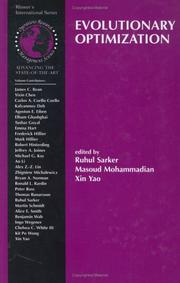
ISBN: 9780792376545 0792376544 9780306480416 9786610462216 1280462213 0306480417 Year: 2002 Publisher: Boston : Kluwer Academic Publishers,
Abstract | Keywords | Export | Availability | Bookmark
 Loading...
Loading...Choose an application
- Reference Manager
- EndNote
- RefWorks (Direct export to RefWorks)
Evolutionary computation techniques have attracted increasing att- tions in recent years for solving complex optimization problems. They are more robust than traditional methods based on formal logics or mathematical programming for many real world OR/MS problems. E- lutionary computation techniques can deal with complex optimization problems better than traditional optimization techniques. However, most papers on the application of evolutionary computation techniques to Operations Research /Management Science (OR/MS) problems have scattered around in different journals and conference proceedings. They also tend to focus on a very special and narrow topic. It is the right time that an archival book series publishes a special volume which - cludes critical reviews of the state-of-art of those evolutionary com- tation techniques which have been found particularly useful for OR/MS problems, and a collection of papers which represent the latest devel- ment in tackling various OR/MS problems by evolutionary computation techniques. This special volume of the book series on Evolutionary - timization aims at filling in this gap in the current literature. The special volume consists of invited papers written by leading - searchers in the field. All papers were peer reviewed by at least two recognised reviewers. The book covers the foundation as well as the practical side of evolutionary optimization.
Mathematical optimization. --- Operations research. --- Evolutionary programming (Computer science) --- Optimisation mathématique --- Recherche opérationnelle --- Programmation évolutive --- Evolutionary programming (Computer science). --- Mathematical optimization --- Operations research --- Applied Mathematics --- Management Theory --- Management --- Engineering & Applied Sciences --- Business & Economics --- Business. --- Leadership. --- Decision making. --- Artificial intelligence. --- Calculus of variations. --- Business and Management. --- Business Strategy/Leadership. --- Operation Research/Decision Theory. --- Optimization. --- Calculus of Variations and Optimal Control; Optimization. --- Artificial Intelligence (incl. Robotics). --- Operations Research/Decision Theory. --- Artificial Intelligence. --- AI (Artificial intelligence) --- Artificial thinking --- Electronic brains --- Intellectronics --- Intelligence, Artificial --- Intelligent machines --- Machine intelligence --- Thinking, Artificial --- Bionics --- Cognitive science --- Digital computer simulation --- Electronic data processing --- Logic machines --- Machine theory --- Self-organizing systems --- Simulation methods --- Fifth generation computers --- Neural computers --- Isoperimetrical problems --- Variations, Calculus of --- Maxima and minima --- Optimization (Mathematics) --- Optimization techniques --- Optimization theory --- Systems optimization --- Mathematical analysis --- System analysis --- Deciding --- Decision (Psychology) --- Decision analysis --- Decision processes --- Making decisions --- Management decisions --- Choice (Psychology) --- Problem solving --- Operational analysis --- Operational research --- Industrial engineering --- Management science --- Research --- System theory --- Ability --- Command of troops --- Followership --- Decision making --- Computer programming
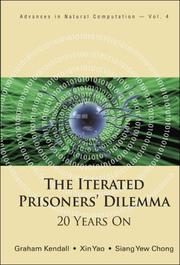
ISBN: 1281121835 9786611121839 9812770682 9789812770684 9789812706973 9789812770684 9812706976 9781281121837 6611121838 Year: 2007 Volume: 4 Publisher: Singapore: World scientific,
Abstract | Keywords | Export | Availability | Bookmark
 Loading...
Loading...Choose an application
- Reference Manager
- EndNote
- RefWorks (Direct export to RefWorks)
In 1984, Robert Axelrod published a book, relating the story of two competitions which he ran, where invited academics entered strategies for the Iterated Prisoners' Dilemma. The book, almost 20 years on, is still widely read and cited by academics and the general public. As a celebration of that landmark work, we have recreated those competitions to celebrate its 20th anniversary, by again inviting academics to submit prisoners' dilemma strategies. The first of these new competitions was run in July 2004, and the second in April 2005. Iterated Prisoners' Dilemma: 20 Years On essentially provi
Prisoner's dilemma game --- Games of strategy (Mathematics) --- Cooperativeness. --- Consensus (Social sciences) --- Authority --- Common good --- General will --- Power (Social sciences) --- Cooperation (Psychology) --- Social psychology --- Games with rational pay-off (Mathematics) --- Rational games (Mathematics) --- Strategy, Games of (Mathematics) --- Game theory --- Group theory --- Mathematical optimization --- Matrices --- Topology --- Decomposed prisoner's dilemma game --- Choice (Psychology) --- Social interaction --- Computer simulation. --- Axelrod, Robert M. --- Games of strategy --- Cooperativeness
Digital
ISBN: 9780387312385 Year: 2006 Publisher: Boston, MA Springer Science+Business Media, LLC
Abstract | Keywords | Export | Availability | Bookmark
 Loading...
Loading...Choose an application
- Reference Manager
- EndNote
- RefWorks (Direct export to RefWorks)
Computer science --- Programming --- Computer architecture. Operating systems --- Information systems --- toegepaste informatica --- hardware --- systeemontwikkeling (informatica) --- methodologieën
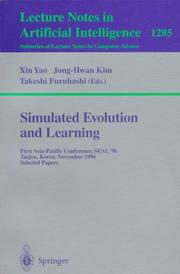
ISBN: 3540633995 3540695389 Year: 1997 Volume: 1285 *167 Publisher: Berlin, Heidelberg : Springer Berlin Heidelberg : Imprint: Springer,
Abstract | Keywords | Export | Availability | Bookmark
 Loading...
Loading...Choose an application
- Reference Manager
- EndNote
- RefWorks (Direct export to RefWorks)
This book constitutes the thoroughly refereed post-conference documentation of the First Asia-Pacific Conference on Simulated Evolution and Learning, SEAL'96, held in Taejon, Korea, in November 1996. The 23 revised full papers were selected for inclusion in this book on the basis of 2 rounds of reviewing and improvements. Also included are invited papers by John L. Casti and Lawrence J. Fogel. The volume covers a wide range of current topics in simulated evolution and learning e.g. evolutionary optimization, evolutionary learning, artificial life, hybrid evolutionary fuzzy systems, evolutionary artificial neural networks, co-evolution, novel evolutionary approaches to computer tomography image reconstruction, power systems load flow control, and water flow control in cropped soils.
Computer simulation --- Evolutionary programming (Computer science) --- Artificial intelligence --- Computer Science --- Engineering & Applied Sciences --- Congresses --- Computer science. --- Computers. --- Artificial intelligence. --- Computer simulation. --- Bioinformatics. --- Computational biology. --- Complexity, Computational. --- Computer Science. --- Artificial Intelligence (incl. Robotics). --- Simulation and Modeling. --- Computation by Abstract Devices. --- Computer Appl. in Life Sciences. --- Complexity. --- Biology --- Engineering. --- Artificial Intelligence. --- Data processing. --- Construction --- Industrial arts --- Technology --- Computer modeling --- Computer models --- Modeling, Computer --- Models, Computer --- Simulation, Computer --- Electromechanical analogies --- Mathematical models --- Simulation methods --- Model-integrated computing --- AI (Artificial intelligence) --- Artificial thinking --- Electronic brains --- Intellectronics --- Intelligence, Artificial --- Intelligent machines --- Machine intelligence --- Thinking, Artificial --- Bionics --- Cognitive science --- Digital computer simulation --- Electronic data processing --- Logic machines --- Machine theory --- Self-organizing systems --- Fifth generation computers --- Neural computers --- Informatics --- Science --- Bioinformatics . --- Computational biology . --- Computational complexity. --- Complexity, Computational --- Bioinformatics --- Bio-informatics --- Biological informatics --- Information science --- Computational biology --- Systems biology --- Automatic computers --- Automatic data processors --- Computer hardware --- Computing machines (Computers) --- Electronic calculating-machines --- Electronic computers --- Hardware, Computer --- Computer systems --- Cybernetics --- Calculators --- Cyberspace --- Data processing
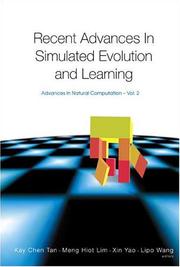
ISBN: 1281872075 9786611872076 981256179X 9789812561794 9789812389527 9812389520 Year: 2004 Publisher: Singapore World Scientific
Abstract | Keywords | Export | Availability | Bookmark
 Loading...
Loading...Choose an application
- Reference Manager
- EndNote
- RefWorks (Direct export to RefWorks)
Inspired by the Darwinian framework of evolution through natural selection and adaptation, the field of evolutionary computation has been growing very rapidly, and is today involved in many diverse application areas. This book covers the latest advances in the theories, algorithms, and applications of simulated evolution and learning techniques. It provides insights into different evolutionary computation techniques and their applications in domains such as scheduling, control and power, robotics, signal processing, and bioinformatics. The book will be of significant value to all postgraduate
| Listing 1 - 10 of 21 | << page >> |
Sort by
|

 Search
Search Feedback
Feedback About UniCat
About UniCat  Help
Help News
News